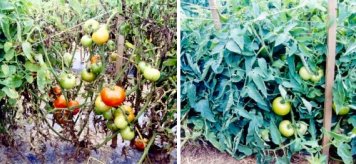Growing healthier tomato plants
How well tomatoes grow depends on how the plants are mulched and fertilized.
Share this:
- Share via email (Opens in new window) Email
- Click to share on Facebook (Opens in new window) Facebook
- Click to share on X (Opens in new window) X
- Click to share on Pinterest (Opens in new window) Pinterest
- Click to share on Reddit (Opens in new window) Reddit
- Share to Google Classroom (Opens in new window) Google Classroom
- Click to print (Opens in new window) Print
By Emily Sohn
If you’ve ever tried to grow your own flowers or vegetables, you know that gardening is an art as much as it is a science. The science part just took a step forward, at least for tomatoes.
The way a tomato plant grows depends on how a farmer mulches and fertilizes it, say researchers from the U.S. Department of Agriculture. They’ve uncovered some unexpected details about the biochemistry that goes into producing the juicy red fruit.
 |
|
These photos show two fields of Sunbeam tomatoes planted at the same time and photographed on the same day. Tomatoes with black plastic around the plants and given standard doses of fertilizer (left) developed more leaf disease and aged faster than the same variety planted in a thick layer of a plant called hairy vetch and given half as much fertilizer (right). |
| Dave Clark, Agricultural Research Service, U.S. Department of Agriculture |
To cut down on weeds and make plants grow more quickly, farmers and gardeners often put black plastic around their tomato plants. Instead of plastic mulch, however, some growers have long preferred to use a type of plant called vetch as mulch.
Over the winter, the farmers grow hairy vetch, which belongs to the bean family. When springtime comes, they mow the vetch and plant tomatoes in the cuttings. The vetch keeps weeds out and nutrients in. Some research has shown that tomatoes last longer and get fewer fungal diseases when grown in dried vetch.
To understand why the system works so well, the researchers first compared two fields of tomatoes. One field got a mulch of vetch and a half dose of fertilizer. The other field got a mulch of plastic and a full dose of fertilizer.
In years with enough rain, tomatoes in the plastic-mulched field began to grow a little bit sooner. But vetch-mulched fields yielded a bigger, healthier crop.
Then, the researchers compared specific genes and proteins in the two crops. In the vetch-mulched plants, they found higher activity in two genes that help protect the plants from fungal attacks and two genes that control how the plants age.
Vetch-mulched tomatoes end up with especially big root systems. So, the researchers suspect that these plants are better at extracting nutrients from the soil. Better nutrition could affect how certain genes work.
Spaghetti sauce anyone?







